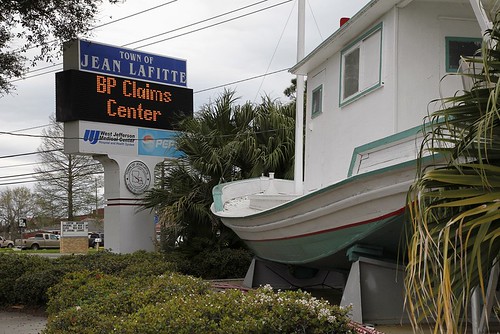[Photo credit: Erika Blumenfeld/Al Jazeera]
Major commercial fishing ports on the Gulf Coast bring in over 1.2 billion pounds of fresh seafood annually, but this will likely decline as Gulf fisheries continue to be affected by BP's disaster. Louisiana provides 40 per cent of all the seafood caught in the continental US, but the state's seafood industry, valued at about $2.3bn, is now fighting for its life.
Dahr Jamail, a reporter for Al Jazeera, has been covering the BP Gulf oil spill since early on in the days of the disaster. He reported last month on the fishermen whose livelihoods depend on the ocean's bounty as they face severely depleted catches and debate whether or not to join in BP’s $7.8 billion “class settlement” or sue the oil giant individually .
This is an important story for America, with the survival of tens of thousands of Gulf fishing families hanging in the balance. But for some reason, it took a journalist from Qatar to get this story out. Jamail's reporting is excellent, and for this report he goes to the fishermen themselves to get the truth.
"I was at a BP coastal restoration meeting yesterday and they tried to tell us they searched 6,000 square miles of the seafloor and found no oil, thanks to Mother Nature," Tuan Dang, a shrimper, told Al Jazeera while standing on a dock full of shrimp boats that would normally be out shrimping this time of year.
Dang's fishing experience has been bleak.
"Normally I can get 8,000 pounds of brown shrimp in four days," he explained. "But this year, I only get 800 pounds in a week. There are hardly any shrimp out there."
When he tried to catch white shrimp, he said he "caught almost nothing".
He is suing BP for loss of income, but does not have much hope, despite recent news of an initial settlement worth more than $7bn. "We'd love to see them clean this up so we can get our lives back, but I don't see that happening anytime soon."
Song Vu, a shrimp boat captain for 20 years, has not tried to shrimp for weeks, and is simply hoping that there will be shrimp to catch next season.
His experience during his last shrimping attempts left him depressed.
"The shrimp are all dead," he told Al Jazeera. "Everything is dead."
There isn't a glimmer of anything that sounds hopeful about the Gulf situation in any of the personal accounts of the fishermen, and as Jamail notes at the end of the article, "Given that after the Exxon Valdez oil disaster in Alaska in 1989, herring have still not come back enough to be a viable fishing resource, this does not bode well for the Gulf seafood industry, whose fisheries are - according to scientists like Cake and Soniat - still in the initial phase of collapse."
Not to mention that the oil continues to seep into the Gulf near the Macondo well.














